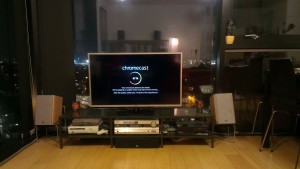Her.
A lonely writer develops an unlikely relationship with his newly purchased operating system that’s designed to meet his every need.
This is a really good film. Some parts are funny and some parts are tragic. But this isn’t a review of a really good film but rather a look at the technology in the film her. There might be some mild spoilers and I would recommend not reading till you’ve seen it in full.
When I first heard about Her, I thought oh no here comes another S1mOne. Don’t get me wrong S1mOne is ok but gets a little silly in parts. Her on the other hand is smart and although it does go towards the obvious, it pulls back and finds a new more interesting path.
Adrian sent me a link to wired’s piece about the UI design in her.
A few weeks into the making of Her, Spike Jonze’s new flick about romance in the age of artificial intelligence, the director had something of a breakthrough. After poring over the work of Ray Kurzweil and other futurists trying to figure out how, exactly, his artificially intelligent female lead should operate, Jonze arrived at a critical insight: Her, he realised, isn’t a movie about technology. It’s a movie about people. With that, the film took shape. Sure, it takes place in the future, but what it’s really concerned with are human relationships, as fragile and complicated as they’ve been from the start.
The film is certainly about people and our relationships in the age of artificial intelligence. Reminds me very much of the book which imran gifted me which I’ve still not read completely, love in the age of algorithms.
But whats really interesting is the simplicity of the technology. Pretty much every interaction is with voice. There’s little interaction with screens, although there are giant screens in some of the shots. Even the camera which the main character uses looks underwhelming simple. I can only suggest in the near future we started to solve the power/battery problems of today.
We decided that the movie wasn’t about technology, or if it was, that the technology should be invisible,” he says. “And not invisible like a piece of glass.” Technology hasn’t disappeared, in other words. It’s dissolved into everyday life.
Here’s another way of putting it. It’s not just that Her, the movie, is focused on people. It also shows us a future where technology is more people-centric. The world Her shows us is one where the technology has receded, or one where we’ve let it recede. It’s a world where the pendulum has swung back the other direction, where a new generation of designers and consumers have accepted that technology isn’t an end in itself-that it’s the real world we’re supposed to be connecting to.
I think Wired is right, the movie is a total U turn on the likes of Minority Report and Blade Runner. There is a great scene where our main character is lying on the grass in a field. He’s talking to the AI like she is lying right next to him. The cinematography actually applies it from the camera angle.
The technology is there but it feels like that Internet of things dream, the technology is embedded everywhere. Not the Google Glass style future. something much closer to ubiquitous…
All of these things contribute to a compelling, cohesive vision of the future — one that’s dramatically different from what we usually see in these types of movies. You could say that Her is, in fact, a counterpoint to that prevailing vision of the future — the anti-Minority Report. Imagining its world wasn’t about heaping new technology on society as we know it today. It was looking at those places where technology could fade into the background, integrate more seamlessly.
After that Wired goes into depth about the User Interface being vocal and how its a perfect fit for the cinema. I don’t disagree but its only one of many types of User Interfaces which can be available. I do agree its a nice depart from touch interfaces which is in most films.
But the AI isn’t simply voice alone (this has been done many times in cinema too), its context sensitive, its perceptive! This is what brings the sense of magic to the exchanges. The AI seems like she is there talking and taking it all in. All those subtle gestures, human expressions, etc. They are all taken into account, making the AI seem very human.
…we’re already making progress down this path. In something as simple as a responsive web layout or iOS 7′s “Do Not Disturb” feature, we’re starting to see designs that are more perceptive about the real world context surrounding them-where or how or when they’re being used. Google Now and other types of predictive software are ushering in a new era of more personalised, more intelligent apps.
Arthur C. Clarke said…
Any sufficiently advanced technology is indistinguishable from magic.
Her is does have a magic quality, its not the best film I’ve seen this year but its one which I do think will cause a trend showcasing different user interfaces in movies, instead of defaulting to the usual push/pull/touch interfaces.
Its well worth watching and enjoying, just don’t think about S1m0ne beforehand.



